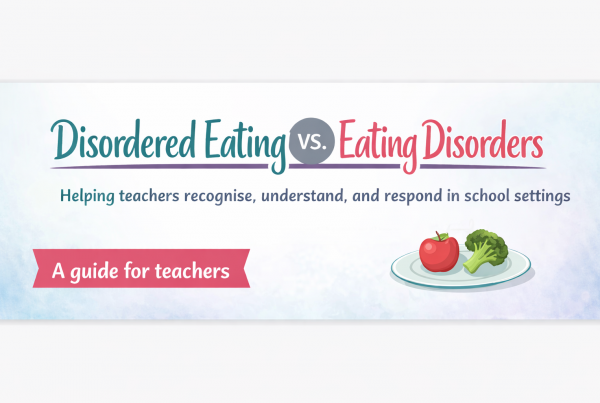Last Updated on June 30, 2025 | Published: October 26, 2024 published by Jenny Tomei
Ozempic has gained popularity as a weight-loss tool due to its impact on appetite. Although it may be effective for controlling diabetes, Ozempic was not intended for weight loss. As its use rises, particularly among young people influenced by social media, it’s essential for teachers, parents, and school communities to understand the potential risks and recognise any signs of its misuse.
How does Ozempic work?
Ozempic is medication used alongside diet and exercise to improve blood sugar control in adults with type 2 diabetes.
Ozempic works by affecting expression of GLP1 – a pancreatic hormone that boosts the effects of insulin, slows gastric emptying, and affects some of the appetite increasing chemicals in the brain. It reduces the amount of sugar released by your liver and slows down food leaving your stomach to help prevent blood sugar spikes.
Signs Someone Is Using Ozempic
Physical Indicators
- Rapid Weight Loss: You may notice a visible reduction in body weight, especially in the face and limbs, where changes can appear more pronounced.
- Injection Marks: Marks from injections may be visible on common injection sites, such as the abdomen, thighs, or upper arms.
- Gastrointestinal Symptoms: Students using Ozempic might frequently complain of nausea, fatigue, or other digestive issues like constipation or stomach pain.
Behavioural Changes
- Altering Eating Habits: Look out for a noticeable change in eating habits, such as skipping meals or showing little interest in food.
- Diet Obsession: Students may discuss dieting and weight loss strategies often or show an unusual focus on weight-related topics.
Risks of Ozempic Use
Ozempic carry a range of side effects and health risks, which are particularly concerning for adolescents. It’s essential for teachers to understand these risks, as they are particularly concerning for teens who are still developing. Quick-fix solutions like Ozempic can carry serious, lasting health consequences.
Short-Term Side Effects
- Common issues: Many users experience nausea, vomiting, dizziness, fatigue, and stomach pain.
- Digestive problems: Side effects may also include acid reflux, diarrhea, and decreased appetite.
Long-Term Health Risks
- Thyroid Tumours: Ozempic includes a warning about the potential risk of thyroid cancer.
- Gallbladder Issues: Using Ozempic may increase the likelihood of developing gallstones.
- Kidney Health: Prolonged use of the medication can potentially impair kidney function.
Who qualifies for Ozempic?
Ozempic is not FDA-approved for weight management. However, in some cases, doctors may prescribe this drug off-label for weight management. Off-label drug use means prescribing a drug for a purpose other than what it’s been approved for by the FDA. Be sure to only use Ozempic as prescribed by your doctor!
You MUST meet the following:
•Have poorly controlled type 2 diabetes
•The National Institute for Health and Care Excellence (NICE) recommends that Ozempic (semaglutide) is prescribed to adults over the age of 18 with type 2 diabetes.
•(BMI) of at least 35, or, exceptionally, a BMI of 30, if they meet the criteria for specialist weight management services.
•Have no diagnosis or family history of thyroid cancer
•Have no diagnosis or family history of pancreatic cancer or pancreatitis
Could using Ozempic cause disordered eating?
Ozempic has been widely covered in the media for its benefits as a weight loss drug. The drug has gained significant media attention as many celebrities including Chelsea Handler, Elon Musk, and Sharon Osbourne reported using the drug to lose weight. It has been featured over the news and over social media. Hashtags including #ozempic, #ozempicface and #ozempicweightloss have upwards of 300 million views on TikTok.
There are many concerns that this drug has strengthened the societal focus on weight loss, ideal body weights, and the associated weight stigma. Research has also suggested the potential for regaining weight after stopping Ozempic may lead to disordered eating. The weight regain also increases user’s health risks, as it may have a negative impact on metabolism, cardiovascular health, and self-image. This may put people at an increased risk for disordered eating.
Ozempic and Social Media
High-Profile Endorsements: When celebrities openly discuss using Ozempic for weight loss, it can lead young people to view the drug as an accessible and safe option, even if it’s not medically appropriate for them.
Examples of Celebrity Mentions: High-profile figures like Amy Schumer have discussed Ozempic’s side effects, while others may share only the benefits without acknowledging potential health risks.
Platforms like TikTok and Instagram enable information (and misinformation) to spread rapidly. The algorithms on these platforms often prioritise content that generates high engagement, such as dramatic before-and-after weight loss videos, which can create a distorted perception of healthy body standards and weight-loss practices.
Impact of “Quick Fix” Messaging: Celebrities often focus on rapid results, which can overshadow the importance of sustainable, healthy lifestyle changes.
Mixed Messages: Even when celebrities share negative experiences with Ozempic, such as experiencing side effects, the underlying message may still suggest that the drug is worth trying for quick weight loss. This can lead to misguided expectations, where young people may underestimate the risks.
Overemphasis on Appearance: Celebrity discussions often focus on physical changes, reinforcing the idea that appearance is the most important aspect of health.
Lack of Medical Guidance: Unlike healthcare professionals, celebrities do not provide medically sound advice, which can mislead their audience
Guidance for Teachers
Starting a Conversation
When discussing sensitive topics like Ozempic use, approach students with empathy. Begin with gentle observations like, “I noticed you seem a bit tired recently.” This conveys genuine concern without placing judgement on the student.
Providing Resources
Encourage students to prioritise healthier, sustainable choices, such as balanced nutrition, regular exercise, and emotional well-being over quick fixes. Offer credible resources, like school counsellors or health professionals, to provide additional support and guidance.
Involving Parents
Share objective observations, such as changes in eating habits or energy levels, with parents. Focus the discussion on the student’s well-being and provide reliable information on the risks associated with unapproved drug use. This collaborative approach can strengthen support for the student.
Useful Links and Resources
https://www.nice.org.uk/guidance/ta910/chapter/Advice
https://www.drugs.com/ozempic.html
JenUp Support Services: JenUp provides resources to support body image and eating concerns among young people.












